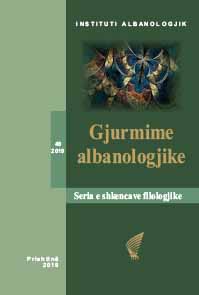KUPTIMET DHE FUNKSIONET E RRJEDHORES SË SHQUAR SHUMËS ME FORMANTIN ‐SHIT NË “MESHARIN” E GJON BUZUKUT (1555)
THE MEANINGS AND FUNCTIONS OF THE PLURAL DEFINITE ABLATIVE WITH -SHIT FORMANT IN GJON BUZUKU'S MESHARI (1555)
Author(s): Mensur VokrriSubject(s): Language studies, Language and Literature Studies, Theoretical Linguistics, Applied Linguistics
Published by: Instituti Albanologjik i Prishtinës
Keywords: Albanian language; plural definite ablative; Gjon Buzuku;
Summary/Abstract: From the review of Meshari of Buzuku about the meanings and functions of definite plural ablative in -shit, these findings can be drawn: The definite plural ablative in -shit in Buzuku’s Meshari is represented in its five fundamental meanings, as: in the origin meaning, detachment meaning (separation or limitation), constituent matter, cause or operative meaning and in the meaning of time. These definite plural ablative meanings are responded functionally by the relevant additional components, which we can attach this way: the ablatives in the origin meaning in some occasions play the role of compliment of place (with nouns that show place) and in some cases they function as indirect object with prepositions (with nouns that note people, animals, actions); the ablatives with the meaning of detachment etc., functionally were responded even by the direct modifiers that complete the verb-predicate as main element within the sentence and the subject in some cases, that is as a main element, consisting with it the subjective group and determining the other nominal element usually an undeter-mined pronoun or any numeral, but not usually a noun; in the ablatives with meaning of constituting element are appeared functions of determinant with direction, which determines the other nominal element within the verbal group, but always as a noun; the ablatives with the meaning of cause, generally the agents are represented by functions of indirect objects with prepositions and in some cases even by the complement of cause, which fulfill the verbs-predicate of the corresponding verbal groups; and the ablatives with time meaning in all cases are represented by the corresponding complements of time, because of their expression with nouns that denote time.
Journal: Gjurmime Albanologjike - Seria e shkencave filologjike
- Issue Year: 2019
- Issue No: 49
- Page Range: 179-189
- Page Count: 11
- Language: Albanian
- Content File-PDF

